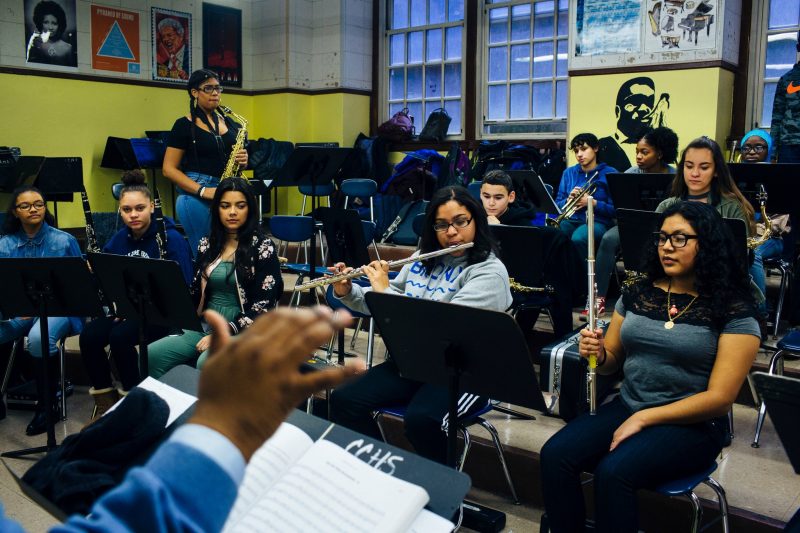Should all schools offer music programs?
By Natalie Proulx
Central photo: At Pelham Preparatory Academy in the Bronx, Steven Oquendo is trying to keep a small band alive by recruiting students from different schools that share the former Christopher Columbus High School campus. Credit Sara Naomi Lewkowicz for The New York Times
Does your school have music classes or programs? Have you ever been involved in one? If so, what was the experience like and what did you learn from it? If not, why not?
In “In New York High Schools, the Sound of Music Is Muted,” Sam Bloch and Kate Taylor write:
… Musical opportunities are now concentrated in a small group of arts-focused schools, like the Celia Cruz Bronx High School of Music, which require auditions, while students at most high schools in the borough have little opportunity to play music.
Music education in New York City schools faced challenges even before the breakup of the comprehensive high schools. During the fiscal crisis of the 1970s, schools laid off thousands of arts teachers. For years after, many schools relied on community groups, or in some cases the city’s elite cultural institutions, to provide part-time music instruction, often through visiting artist programs.
Music programs were rebuilt in the 1990s, thanks in part to funding from the Annenberg Foundation, and to a dedicated arts funding stream known as Project Arts, established by Rudolph W. Giuliani. But the renaissance was short-lived. In the early 2000s, federal pressure from No Child Left Behind legislation led urban school districts to focus more heavily on math and reading instruction, to the detriment of arts classes. In New York City, Project Arts was dissolved, and Mayor Michael R. Bloomberg began breaking up the city’s dropout factories.
The new, smaller schools have a hard time offering specialized programs, whether music or sports. Some principals say that, while they would like to be able to offer music programs, they have to prioritize core academic subjects.
Sandra Burgos, the principal of Astor Collegiate Academy, a school of 481 students on the second floor of the Columbus campus, said that she would love to hire a music teacher, but with limited resources — only 28 teachers and 17 classrooms — she feels it’s more important to offer science, technology, engineering and math courses.
“That’s where most of the jobs are going to be for this group of kids,” she said.
In addition to lacking a teacher, the school doesn’t have a soundproof room where students could play music. In the past, a computer teacher led a guitar club after school. But when that teacher left, the club ended, and the school’s eight guitars are now locked in an equipment closet.
Nationwide, high school music participation has “stayed relatively stable over the last 20 years or so,” said Mike Blakeslee, executive director of the National Association for Music Education. But there are significant variations between districts, with districts with more small schools and charter schools falling behind in music participation.
Students: Read the entire article, then tell us:
— In your opinion, is music a valuable part of the education experience? Do you think all schools should offer music programs? Or should funding go toward other areas, such as core academic subjects, sports or college counseling? Why do you think the way you do?
— Is music a priority at your school? How do you feel about this? Do you think your school should put more or less emphasis on the arts? Why?
— Do you think students should be required to take a music class at some point in their education? If so, what classes, until what grade and why? If not, why not?
— If money were no object at your school, which kinds of music classes would you want offered and why?
